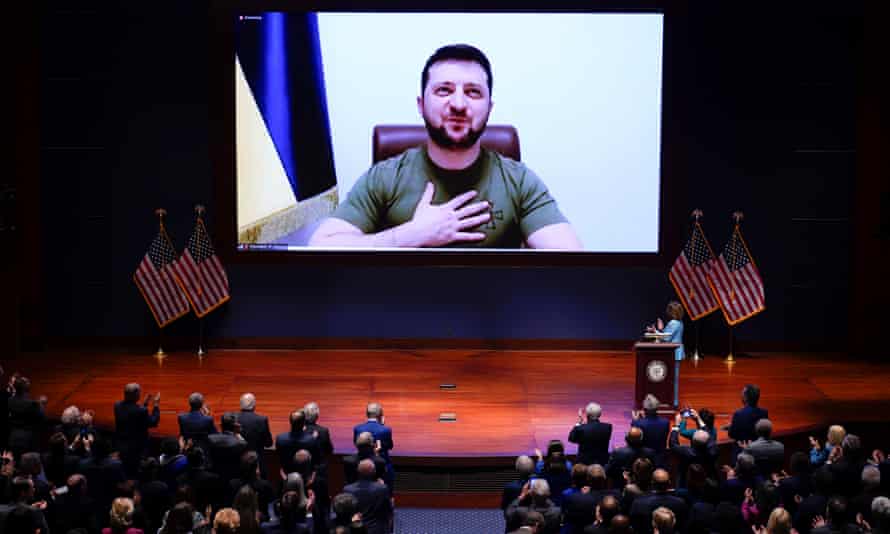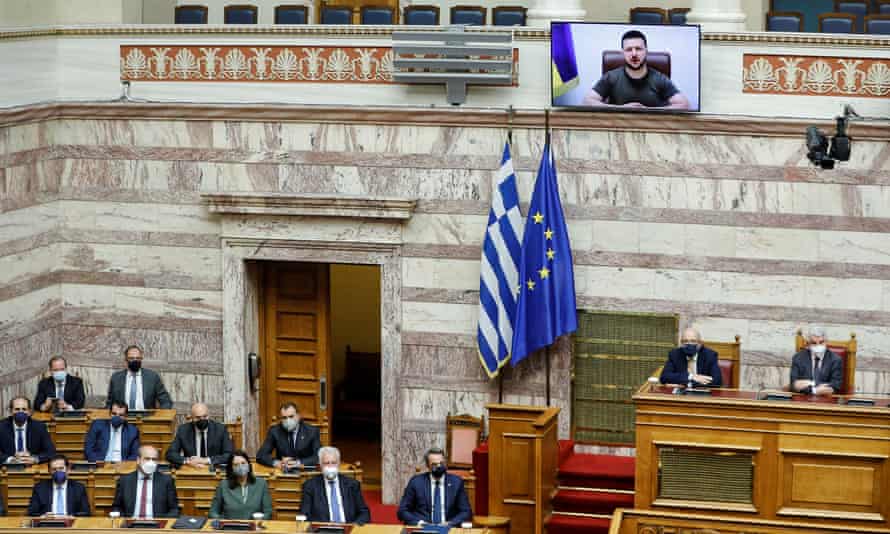On day 50 of Russia’s invasion, Volodymyr Zelenskiy made his nightly address to the Ukrainian people. Vladimir Putin had confidently expected to seize Ukraine in five days, Zelenskiy said, standing outside his neo-classical administration building in central Kyiv. Putin was now “making friends with reality”, he added mordantly, hailing the bravery and staunchness of his citizens.
There was a reference to Russia’s flagship Moskva, which Ukraine says it audaciously sank last Wednesday with two lethal Neptune missiles. The warship has become a meme and symbol of national defiance, ever since Ukrainian soldiers stationed on Snake Island in the Black Sea told it in the first days of the conflict to “go and fuck yourself”.
Zelenskiy avoided the F word. He praised those who “have shown that Russian ships can” – dramatic pause – “go to the bottom of the sea”. He also paid tribute to the men and women who had driven Russian troops from the north, stalled them in the south and heroically defended Mariupol. As usual, he ended his speech with: “Slava Ukraini” – Glory to Ukraine.
On the battlefield, Ukraine’s fortunes have been mixed. Russia’s armed units have been forced to withdraw from the Kyiv region after failing to seize the capital. But they have made significant advances along the Sea of Azov, carving a land corridor from Crimea to separatist-controlled territory in the east, where a Russian offensive is imminent.
On the information front, however, Ukraine has offered a masterclass in message. Zelenskiy’s speeches to his people, and his addresses to foreign parliaments around the world, have galvanised international support and shored up morale at home. They have been gripping viewing, an unvarnished real-time video blog from Europe’s bloody frontline.
The writer of them is a 38-year-old former journalist and political analyst with fewer than 200 followers on Twitter. In an interview conducted via WhatsApp, Dmyro Lytvyn told the Observer the ideas behind the speeches were Zelenskiy’s: “The president always knows what he wants to say, and how he wants to say it.”
He added: “In the speeches, emotions are most important. And of course the president is author of emotions and the logic of the words.” Other world leaders “might learn how to do it”. In other words they might emulate Zelenskiy’s punchy combination of frankness and emotional power.
Lytvyn is part of the president’s inner team. He and his colleagues have been living and working at Bankova – Ukraine’s equivalent of the White House or Downing Street – since the first days of the invasion. A one-time columnist with the Levyy Bereg weekly news magazine, named after the left bank of the Dnipro River, Lytvyn was reluctant to say more. “I don’t usually comment on this topic,” he said.
Serhiy Leshchenko, another former journalist turned wartime Zelenskiy adviser, described Lytvyn as a literary and artistic assistant: “He collects the president’s ideas each day. He works as a mind or sense collector.” One day the theme might be the barbarism of Russian soldiers, the next Ukraine’s urgent need for defensive weapons.
Lytvyn has been in the thick of Ukrainian politics for sometime. He was a political analyst for Servant of the People, Zelenskiy’s political party, and a bitter opponent of Petro Poroshenko, Zelenskiy’s predecessor as president. One former colleague said Lytvyn’s attacks on the country’s post-2014 leadership after the pro-European Maidan uprising had split Ukrainian society. “I’m not a fan. But he’s smart,” the colleague added.

Writing on Facebook at the beginning of the war, Lytvyn made several shrewd points about Putin. “His imagination is poor, so he always mirrors something … We have to understand that objective reality does not control Putin. The west’s sanctions will not affect him. He seeks isolation.” Putin’s implacable goal was to change the state and Ukraine’s “political reality”, he posted.
Lytvyn’s method certainly works. Polls show 95% of Ukrainians believe their country can repel Russia’s invasion, despite Kyiv’s inferiority in terms of tanks, troops and aviation. And 78% believe Ukraine is moving in the right direction. Zelenskiy’s personal ratings, depressed at the beginning of February, have skyrocketed.
Orysia Lutsevych, manager of the Ukraine forum at foreign policy thinktank Chatham House, said Zelenskiy’s previous career as an actor and comedian was key to his success. Viewers were used to seeing him in different roles on television and were therefore able to accept him as “commander-in-chief in a T-shirt” – a feat that eludes more conventional politicians.
“They know he can transform. He’s like metamorphosis Zelenskiy,” she said. “He’s a modern-day statesman who came from entertainment. He’s in his element. People around him understand the power of narrative during a war. After the horrors of Bucha, it’s important to have a galvanising story. The sinking of the Moskva is a powerful symbol.”
Lutsevych said Zelenskiy and his co-writers had created a sense of “historical mission”, which linked Ukraine’s current struggle with previous battles against Moscow. They were also well versed in pop culture, presenting the war as “light versus darkness”. In this Lord of the Rings-style drama, Russian soldiers were “orcs” and Putin an invisible Sauron.
Many of Zelenskiy’s senior advisers come from television, and worked with him at Kvartal-95, his production studio. Their attempts to win global support are helped by the clear-cut nature of Russia’s invasion. Ukraine is the victim. It is fighting for survival. This makes Zelenskiy the leader of what political scientist Ivan Krastev calls a “romantic constellation”.

Zelenskiy is at ease in front of a camera, whether speaking into his iPhone or addressing citizens from his bunker. When he was elected in 2019, he had few concrete political ideas. He tried to distinguish himself from his predecessors by giving lengthy press conferences. These days, his interactions are snappier. Lutsevych said his daily speeches “resonate well”.
They are also immaculately tailored to particular audiences. Addressing the House of Commons on day 13 of the invasion, Zelenskiy likened Ukraine’s struggle against Russia to Great Britain’s against Hitler. “We will fight until the end, at sea, in the air. We will continue fighting for our land, whatever the cost … We will fight in the forests, in the fields, on the shores, in the streets.”
For Brits, then, Zelenskiy invoked Churchill. For the Greek parliament it was Mariupol – home to many ethnic Greeks – and for the Finns, Molotov cocktails, hurled against Soviet invaders. Speaking to Australians, Zelenskiy cited MH17, the Malaysian Airlines plane shot down by Russia in 2014. Talking to the US Congress, he likened the bombardment of Ukraine to Pearl Harbor and 9/11.
Zelenskiy matches this lofty rhetoric with concrete requests. He has called for Ukraine to be given anti-aircraft systems, MiG fighter jets, tanks, and armoured vehicles. He wants further sanctions against Moscow, including a complete oil embargo. At times he can be reproving. Germany’s president, Frank-Walter Steinmeier, was told last week not to visit Kyiv because of his close ties to Russia.
Ihor Todorov, professor of international relations at Uzhhorod university in western Ukraine, said Zelenskiy could be emotional and undiplomatic. His early presidency often resembled Servant of the People, the hit Ukrainian TV sitcom where Zelenskiy played a history teacher who becomes president by accident. The war transformed Zelenskiy, as it did Stalin in 1941, he said.
“Zelenskiy has responded well to the situation,” he said. “A lot of people who didn’t vote for him two years ago recognise this.” He added that the president’s wife, Olena, had much to do with the passionate tone of his addresses, and that other people were also involved, including Yuri Kostyuk, one of the scriptwriters on Servant of the People.
So is Zelenskiy Ukraine’s answer to Churchill? No, said Tordorov: “To compare Zelenskiy to the cult of Winston is too much.” Lutsevych agreed. “Churchill was a lot more charismatic and ego-driven,” she said. “But Zelenskiy is quite effective.”